UCMJ Articles
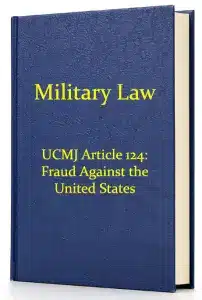
UCMJ Article 124: Fraud Against the United States
False and fraudulent claims include not only those containing some material false statement but also claims that the claimant knows to have been paid or for some other reason the claimant knows the claimant is not authorized to present or upon which the claimant knows the claimant has no right to collect.
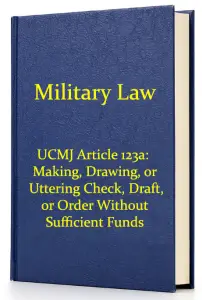
UCMJ Article 123a: Making, Drawing, or Uttering Check, Draft, or Order Without Sufficient Funds
Article 123a discourages financial irresponsibility by criminalizing checks or drafts when the accused is aware of insufficient funds available when the check or draft is presented for payment.
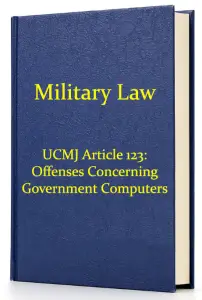
UCMJ Article 123: Offenses Concerning Government Computers
This includes unauthorized access in conjunction with authorized access. Classified information is self-explanatory, but protected information refers to non-classified information and controlled information as designated by the Secretary of Defense.
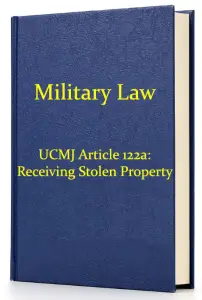
UCMJ Article 122a: Receiving Stolen Property
Receiving stolen property is wrongful if it is without justification or excuse. The actual thief is not criminally liable for receiving the property stolen; however, a principal to the larceny, when not the actual thief, may be found guilty of knowingly receiving the stolen property but may not be found guilty of both the robbery and acquiring the property.
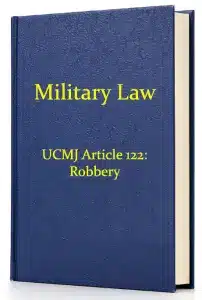
UCMJ Article 122: Robbery
For a robbery to be committed by force or violence, there must be actual force or violence to the person preceding or accompanying the taking against the person’s will, and it is immaterial that there is no fear engendered in the victim.
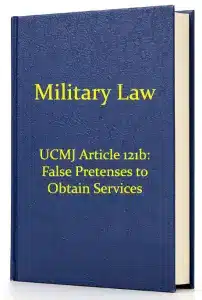
UCMJ Article 121b: False Pretenses to Obtain Services
This offense is similar to theft and wrongful appropriation by pretenses (Article 121), except that the object of the obtaining is services rather than money, personal property, or articles of value.
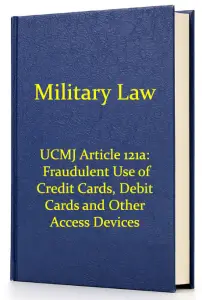
UCMJ Article 121a: Fraudulent Use of Credit Cards, Debit Cards and Other Access Devices
The provision of the use of a credit card, debit card, or other access device without the authorization of a person whose authorization was required for such use applies to situations where an accused has no authorization to use the access device from a person whose authorization is required for such use, as well as situations where an accused exceeds the authorization of a person whose authorization is required for such use.
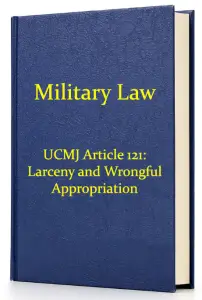
UCMJ Article 121: Larceny and Wrongful Appropriation
The taking, obtaining, or withholding of the property must be wrongful. As a general rule, taking or withholding property from the possession of another is wrongful if done without the consent of the other, and obtaining property from the possession of another is banned if the obtaining is by pretense.
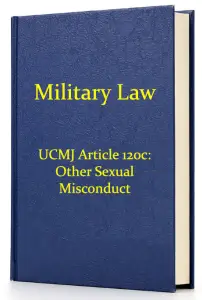
UCMJ Article 120c: Other Sexual Misconduct
Crimes related to sexual misconduct that do not fall under the categories of sexual assault or rape are prosecuted under Article 120c of the UCMJ. A military member accused of voyeurism, taping and distributing pornography, indecent exposure, or forcible pandering will be subject to prosecution under Article 120c of the UCMJ.
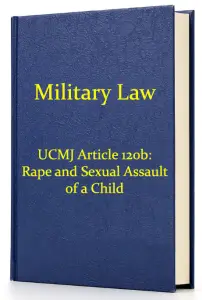
UCMJ Article 120b: Rape and Sexual Assault of a Child
A military member who rapes, sexually assaults, or physically abuses or threatens to abuse a child under the age of 16 years old will face charges under Article 120b of the UCMJ.
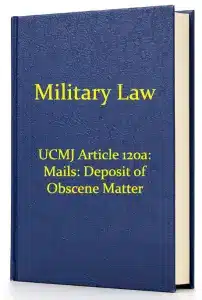
UCMJ Article 120a: Mails: Deposit of Obscene Matter
Whether something is obscene is a question of fact, and, for this article, nasty is synonymous with indecent. The matter must violate community standards of decency or obscenity and must go beyond customary limits of expression.
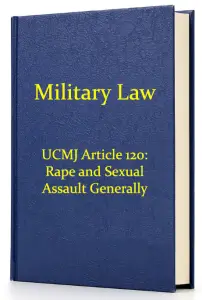
UCMJ Article 120: Rape and Sexual Assault Generally
A service member of the United States Armed Forces who rapes, sexually assaults, or physically abuses or threatens to abuse another person with sexual contact, groping, or unwanted sexual advances will be charged under Article 120 of the UCMJ.



